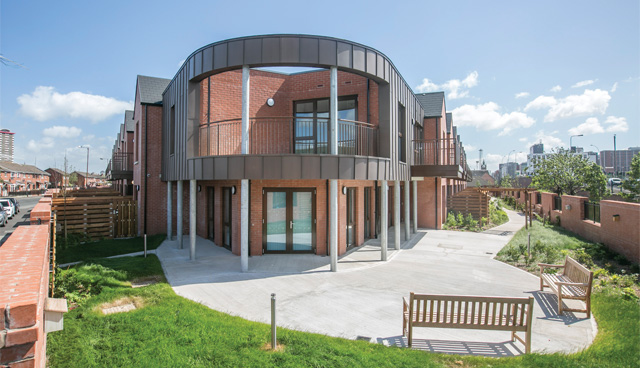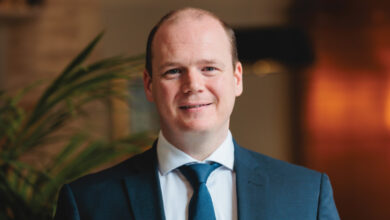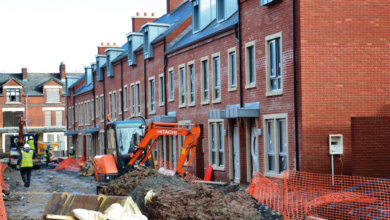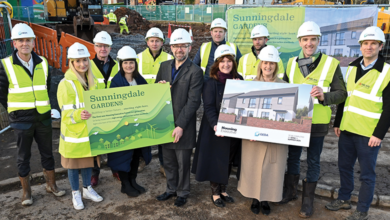Delivering with purpose

As Clanmil Housing Group launches its new ambitious five-year strategy, Chief Executive Clare McCarty discusses the heightened importance of people-focused delivery as we emerge from the pandemic.
With over 30 years’ experience at the helm of Clanmil Housing Group, McCarty remains passionate about Clanmil’s purpose, to provide homes for people to live well. She is clear that quality homes and connected communities create safety, stability and opportunity.
This is at the heart of Clanmil’s new five-year strategy, which the Chief Executive says is designed to “stretch the organisation and maximise its potential for good”.
Clanmil has an annual turnover of circa £40.3 million and owns over 5,500 homes, ranging from family homes to supported housing and independent living for older people and people living with dementia.
McCarty is excited about the new plan, which has been shaped by colleagues, customers and stakeholders, and is values driven. It aims to reaffirm Clanmil’s purpose and to become a living guide as to not only what Clanmil does, but how it does it.
Built in the plan are the lessons learned from the pandemic, acknowledging the impact that this has had on both the organisation and its customers. McCarty paid tribute to the great effort by Clanmil staff to keep people safe, connected and key services maintained during this period. An acknowledgment of the differing impacts this unprecedented trauma will have on people is referenced by McCarty, referring to a built in sensitivity and empathy to plans going forward. This is also reflected in the new ways of working being introduced at Clanmil.
Referring back to the five-year strategy, McCarty emphasises that it aims to make every customer experience a positive one, never losing sight of the individual and their unique needs.
One of the key themes within the new Clanmil strategy is to provide services that make life easier for its customers. McCarty explains: “We want our customers to sustain their tenancies for as long as they choose, so it’s important that we remain responsive to changing customer needs and that we make it easy for them to do business with us. We need to build and maintain healthy, trusting and respectful relationships and empower people to help shape the standard of services we provide.”
The Chief Executive says that the “person-centred strategy” will “stretch what we can do as a housing association and as a social enterprise, in terms of being a force for good”.
“We believe there are more ways in which we can support people and their communities beyond simply providing them with a home. We are passionate about playing our part in helping to make Northern Ireland a more shared and inclusive place to live and we know that shared communities have a lasting positive impact on people’s lives.”
McCarty continues: “We are also passionate about providing much needed homes for the near 30,000 people in urgent need of a home in Northern Ireland. The plan has a target of providing 1,400 homes over the next five years, with a mixed tenure approach.” Quality design and place-shaping is important to Clanmil, as is the environmental impact and it aims to introduce a target to reduce its carbon footprint over the life of the plan. Reducing fuel poverty remains a related key aim.
In 2020, Clanmil was responsible for almost 20 per cent of new social homes provided in Northern Ireland and delivered around 1,000 new homes at over £110 million in the last three years.
McCarty points out that: “The pandemic has served to reinforce the importance of the home in relation to safety, space and wellbeing. Our investments will be targeted not just on increasing the number of homes we provide and on place shaping but also, and very importantly, in our existing homes. We want our customers to be proud of where they live.”
The Chief Executive welcomes the discussion to include housing as a key output of the Programme for Government, commenting that housing is so evidently critical to most of the ambition of the Programme. Commenting on the Minister’s ambition to transform the housing sector and enabling the Housing Executive to raise funds for retrofitting and development, she welcomes the potential this may bring in terms of increased collaboration and joined up working, and additional leverage on issues such as land supply, planning delays, infrastructure failures and allocations.
She adds: “I believe housing associations could do more, if we were asked to do that, and it’s collaboration and sharing which could be really powerful in relation to social housing delivery.”
In conclusion, McCarty looks forward to sharing the detail of the plan with colleagues and stakeholders and implementing lessons learned from the last year to positive effect.
Clanmil Housing Group
T: 028 9087 6000
E: housing@clanmil.org.uk
W: www.clanmil.org








